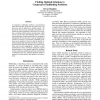Free Online Productivity Tools
i2Speak
i2Symbol
i2OCR
iTex2Img
iWeb2Print
iWeb2Shot
i2Type
iPdf2Split
iPdf2Merge
i2Bopomofo
i2Arabic
i2Style
i2Image
i2PDF
iLatex2Rtf
Sci2ools
AAAI
2010
2010
Finding Optimal Solutions to Cooperative Pathfinding Problems
In cooperative pathfinding problems, non-interfering paths that bring each agent from its current state to its goal state must be planned for multiple agents. We present the first practical, admissible, and complete algorithm for solving problems of this kind. First, we propose a technique called operator decomposition, which can be used to reduce the branching factors of many search algorithms, including algorithms for cooperative pathfinding. We then show how a type of independence common in instances of cooperative pathfinding problems can be exploited. Next, we take the idea of exploiting independent subproblems further by adding improvements that allow the algorithm to recognize many more cases of such independence. Finally, we show empirically that these techniques drastically improve the performance of the standard admissible algorithm for the cooperative pathfinding problem, and that their combination results in a complete algorithm capable of optimally solving relatively larg...
AAAI 2010 | Algorithm | Cooperative Pathfinding | Cooperative Pathfinding Problem | Intelligent Agents |
Related Content
| Added | 29 Oct 2010 |
| Updated | 29 Oct 2010 |
| Type | Conference |
| Year | 2010 |
| Where | AAAI |
| Authors | Trevor Scott Standley |
Comments (0)

